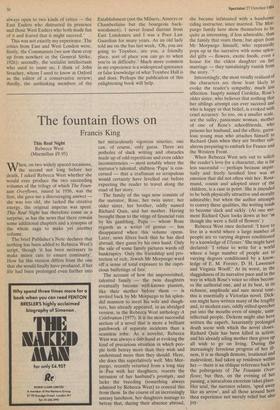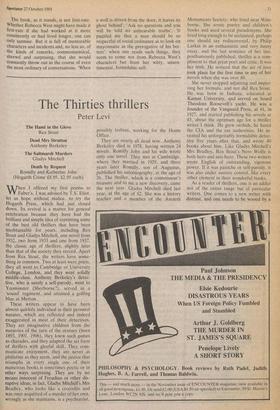The fountain flows on
Francis King
This Real Night Rebecca West (Macmillan £9.95)
when, on two widely spaced occasions, the second not long before her death, I asked Rebecca West whether she would ever produce the two succeeding volumes of the trilogy of which The Foun- tain Overflows, issued in 1956, was the first, she gave me a discouraging answer she was too old, she lacked the creative energy, the original impetus was spent. This Real Night has therefore come as a surprise, as has the news that there remain some additional chapters and a.synopsis of the whole saga to make yet another volume.
The brief Publisher's Note declares that nothing has been added to Rebecca West's script, though 'it has been necessary to make minor cuts to ensure continuity'. How far this version differs from the one that she would finally have produced, if her life had been prolonged even further into her miraculously vigorous nineties, one can, of course, only guess. There are potholes of slack writing and obstacles made up of odd repetitions and even odder inconsistencies — most notably where the narrator's talented, shiftless 'Papa' is con- cerned — that a craftsman so scrupulous would certainly have levelled out before expecting the reader to travel along the road of her story.
The family of the saga now consists of the narrator, Rose, her twin sister, her older sister, her brother, oddly named Richard Quin, and her mother. Having brought them to the verge of financial ruin by his gambling, Papa — whom Rose regards as a writer of genius — has disappeared when this volume opens. Later, news filters back that he has died abroad, they guess by his own hand. Only the sale of some family pictures wards off bankruptcy. Only the friendship and pro- tection of rich, Jewish Mr Morpurgo ward off a sense of total exposure to the capri- cious buffetings of fate.
The account of how the impoverished, talented family — the twin daughters eventually become well-known pianists, like their mother before them — is invited back by Mr Morpurgo to his splen- did mansion to meet his wife and daugh- ters, has already appeared, in an abridged version, in the Rebecca West anthology A Celebration (1977). It is the most successful section of a novel that is more a brilliant patchwork of separate incidents than a seamless robe. As a novelist, Rebecca West was always a dab-hand at evoking the kind of precarious situation in which peo- ple both betray more than they wish and understand more than they should. Here, she does this superlatively well. Mrs Mor- purgo, recently returned from a long stay in Pau with her daughters, resents the intrusion of her husband's proteges, and lacks the breeding (something always admired by Rebecca West) to conceal this from them. In the course of an increasingly uneasy luncheon, her daughters manage to betray that, during their absence abroad,
she became infatuated with a handsome riding instructor, since married. The Mor- purgo family here show themselves to be quite as interesting, if less admirable, than the family that visits them; but apart from Mr Morpurgo himself, who repeatedly pops up in the narrative with some splen- did gifts — flowers, exotic foods, even a house for the eldest daughter on her marriage — they tantalisingly vanish from the story.
Interestingly, the most vividly realised of the characters are those least likely to evoke the reader's sympathy, much less affection. Inaptly named Cordelia, Rose's older sister, who believes that nothing that her siblings attempt can ever succeed and who is happy in that belief, is evoked with cruel accuracy. So too, on a smaller scale, are the sulky, passionate woman, mother of one of Rose's schoolfriends, who poisons her husband, and the effete, garru- lous young man who attaches himself to Richard Quin when they are brother sub- alterns preparing to embark for France and the Western Front.
When Rebecca West sets out to solicit the reader's love for a character, she is far less successful — perhaps because impar- tially and freely lavished love was an emotion that did not often visit her. Rosa- mund, cousin and adopted sister of the children, is a case in point. She is intended to be both physically attractive and morally admirable; but when the author attempts to convey these qualities, the writing tends to become slack and sickly. (At one mo- ment Richard Quin looks down at her 'as though she were a field of flowers'.) Rebecca West once declared: 'I have to live in a world where a large number of people are to varying degrees conditioned by a knowledge of Ulysses.' She might have declared: 'I refuse to write for a world where a large number of people are to varying degrees conditioned by a know- ledge of E. M. Forster, D. H. Lawrence and Virginia Woolf.' At its worst, in the sluggishness of its narrative pace and in the way in which Rose's voice so often becom- es the authorial one, and at its best, in its richness, amplitude and sure moral tone, this is essentially a Victorian novel. Dick- ens might have written many of the lengthy and, to modern ears, oddly stilted speeches put into the mouths even of simple, unin- tellectual people. Dickens might also have written the superb, luxuriantly prolonged death scene with which the novel closes. Richard Quin has been killed in action; and his already ailing mother then gives up all wish to go on living. During the increasingly ferocious progress of her ill- ness, it is as though demons, irrational and malevolent, had taken up residence within her — there is an oblique reference back to the poltergeists of The Fountain Over- flows; but then, on the evening of her passing, a miraculous exorcism takes place. Her soul, the narrator relates, 'sped away like an arrow', and all those around here then experience not merely relief but also joy.
The book, as it stands, is not first-rate. Whether Rebecca West might have made it first-rate if she had worked at it more consistently or had lived longer, one can only surmise. But it is full of memorable characters and incidents arid, no less so, of the kinds of remarks, commonsensical, shrewd and surprising, that she would constantly throw out in the course of even the most ordinary of conversations. 'When a wolf is driven from the door, it leaves its ghost behind'; 'Ask no questions and you will be told no unbearable truths'; 'It puzzled me that a man should be so respectful of social ordinance as to look on mayonnaise as the prerogative of his bet- ters': when one reads such things, they seem to come not from Rebecca West's characters but from her witty, unsen- timental, formidable self.



















































 Previous page
Previous page